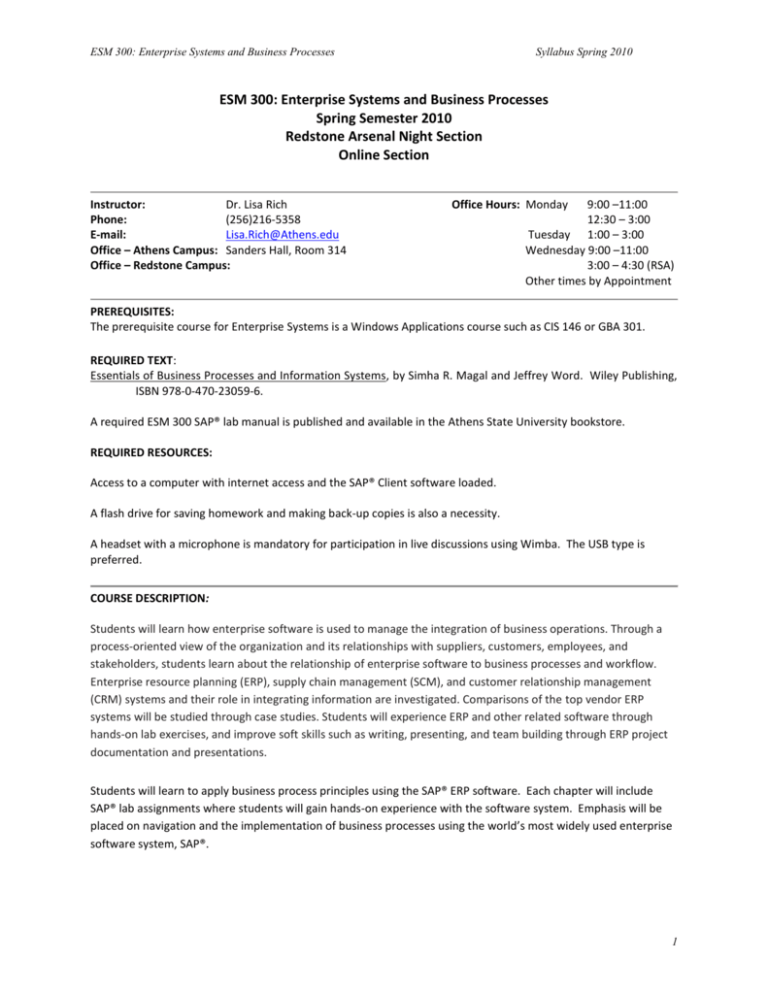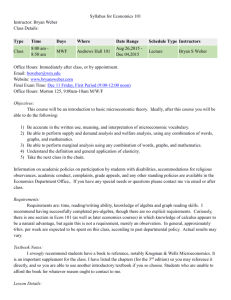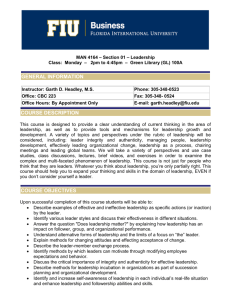prerequisites - athensstatesapfaculty
advertisement

ESM 300: Enterprise Systems and Business Processes Syllabus Spring 2010 ESM 300: Enterprise Systems and Business Processes Spring Semester 2010 Redstone Arsenal Night Section Online Section Instructor: Dr. Lisa Rich Phone: (256)216-5358 E-mail: Lisa.Rich@Athens.edu Office – Athens Campus: Sanders Hall, Room 314 Office – Redstone Campus: Office Hours: Monday 9:00 –11:00 12:30 – 3:00 Tuesday 1:00 – 3:00 Wednesday 9:00 –11:00 3:00 – 4:30 (RSA) Other times by Appointment PREREQUISITES: The prerequisite course for Enterprise Systems is a Windows Applications course such as CIS 146 or GBA 301. REQUIRED TEXT: Essentials of Business Processes and Information Systems, by Simha R. Magal and Jeffrey Word. Wiley Publishing, ISBN 978-0-470-23059-6. A required ESM 300 SAP® lab manual is published and available in the Athens State University bookstore. REQUIRED RESOURCES: Access to a computer with internet access and the SAP® Client software loaded. A flash drive for saving homework and making back-up copies is also a necessity. A headset with a microphone is mandatory for participation in live discussions using Wimba. The USB type is preferred. COURSE DESCRIPTION: Students will learn how enterprise software is used to manage the integration of business operations. Through a process-oriented view of the organization and its relationships with suppliers, customers, employees, and stakeholders, students learn about the relationship of enterprise software to business processes and workflow. Enterprise resource planning (ERP), supply chain management (SCM), and customer relationship management (CRM) systems and their role in integrating information are investigated. Comparisons of the top vendor ERP systems will be studied through case studies. Students will experience ERP and other related software through hands-on lab exercises, and improve soft skills such as writing, presenting, and team building through ERP project documentation and presentations. Students will learn to apply business process principles using the SAP® ERP software. Each chapter will include SAP® lab assignments where students will gain hands-on experience with the software system. Emphasis will be placed on navigation and the implementation of business processes using the world’s most widely used enterprise software system, SAP®. 1 ESM 300: Enterprise Systems and Business Processes Syllabus Spring 2010 COURSE OBJECTIVES AND/OR GOALS 1. 2. 3. 4. 5. 6. 7. Develop critical-thinking and decision-making skills as related to information systems subjects. (CR 1,Outcome 1,5) Provide technology-enhanced learning and encourage competency in the use of information technology. (CR 2, Outcome 2) Develop an understanding of effective managerial, leadership, and group interaction skills necessary for information systems related projects. (CR 3, Outcome 4) Develop both oral and written communication skills on IS-related topics. (CR4, Outcome 6) Enhance the capability to recognize and understand ethical behaviors and issues in IS. (CR 5, Outcome 7) Enhance understanding of the global economy, including an understanding of diversity in IS field. (CR 6, Outcome 3) Develop an understanding of professionalism required in management of IS. (CR 7, Outcome 8). COURSE REQUIREMENTS: 1. Develop critical-thinking and decision-making skills: Students will be required to conduct internet research and analyze Internet site information content. 2. Provide technology-enhanced learning and encourage competency in the use of technology: Students will be required to use the course web site, conduct Internet based research, and complete assignments using word processor, data analysis, and/or presentation software. 3. Develop an understanding of effective managerial, leadership, and group interaction skills: Students will be required to participate in groups on selected topics using technology. 4. Develop both oral and written communication skills: Students will be required to make presentations and maintain an e-portfolio of project assignments. 5. Enhance the capability to recognize and understand ethical behaviors and issues. Students will be required to discuss ethical issues associated with each major IS topic covered during the course, to include both business and personal ethical behavior. 6. Enhance understanding of the global economy, including an understanding of diversity. Students will be required to understand the prevalence of and reasons for off-shoring and the outsourcing of information technology. 7. Enhance understanding of the role of professionalism in business. Students will be required to study net etiquette, submit a complete e-portfolio, and present all project assignments. These documents must be submitted as if it is to be submitted to a customer in a professional format within the established time line. OUTCOMES 1. A knowledge of accounting, economics, management, marketing, quantitative skills, legal issues, and production theory and concepts. 2. A knowledge of technology, as it relates to business. 3. A knowledge of the global economy, including an understanding of diversity issues. 4. A knowledge of and an ability to use effective managerial, leadership, and group interaction skills. 5. An ability to effectively use critical-thinking and decision-making techniques. 6. An ability to effectively communicate, both orally and in writing. 7. An understanding of ethical issues and the importance of maintaining ethical standards. 8. An understanding of and an ability to perform at a professional level. 2 ESM 300: Enterprise Systems and Business Processes Syllabus Spring 2010 EVALUATION/GRADING POLICY: Tests Orientation Participation/Wimba/Discussions SAP® Lab Assignments Total 30% 10% 10% 50% 100 % Course Grading is based on a 0 – 100 scale with 90 - 100 = A, 80 – 89 = B, 70 – 79 = C, 60 – 69 = D, and Below 60 = F. Do not expect grades to be scaled or curved at the end of the semester. “What you earn is what you’ll get.” * The exchange of ideas between students engaged in scholarly inquiry is a key aspect of learning, and is a requisite activity in this course. Distance students are expected to view the recorded Tegrity lectures so that they can keep up with class discussions and the learning experience that takes place there. Where appropriate, some class discussions will take place via the Wimba Live Classroom and the Discussion Board. To count as participation, student participation and postings need to be thoughtful; that is, they should refer to the week's readings, relevant issues in the news, information obtained from other sources, or ideas expressed in class by other class members. Participation in Wimba must be Active - attendance is not the same as participation. For discussion postings, a thoughtful posting must be 150 words at a minimum. At least 2 references must be included in each post. MAKE-UP WORK All examination scores are posted in blackboard. Failure to take an exam within the established date and time limit will result in a grade of zero for the exam. It is the student’s responsibility to read the course schedule and be aware of the dates for exams. All exams and assignments are available from the first day of the term until the due date and time posted in the Course Schedule. All students are expected to take the exams on time and online. For campus students, if there is some medical reason that you cannot take the exam online please inform your instructor during the first two weeks of the term and other arrangement will be made. There is ONLY 1 opportunity for a makeup exam during entire term. During the final exam period, a multiple choice, COMPREHENSIVE exam, covering the ENTIRE textbook, will be made available in Blackboard for a LIMITED TIME. Each student has the option of taking this exam to replace a 0 earned from missing an exam or to replace a disappointingly low exam grade. DO NOT ASK YOUR PROFESSOR FOR ANY OTHER MAKE-UP WORK DURING THE TERM. THIS IS YOUR ONLY OPPORTUNITY TO MAKE-UP A MISSED EXAM. ASSIGNMENT POLICY: All of the course assignments have been made available for you in the Blackboard course from the first day of the term until the due date and time posted in the Course Schedule. You are responsible for reviewing the course lectures, handouts, and completing assignments listed on the course schedule. Assignments are posted in the Assignment link in blackboard and must be submitted by the due date. Late assignments will not be accepted and a grade of 0 will be earned. For emergency situations with medical excuse accompanied by a physician’s note on letterhead, an incomplete can be awarded by the date specified provided the student has completed at least 50% of the coursework. 3 ESM 300: Enterprise Systems and Business Processes Syllabus Spring 2010 DISABILITY ACCOMMODATION STATEMENT: If a student has a disability that might require special materials, services, or assistance, the student should arrange to see the Counselor for Special Needs, Sandridge Student Center, telephone number (256) 233-8285. The Counselor will notify the instructor within the first 2 weeks of the term and arrange for special accommodations. ACADEMIC MISCONDUCT: All acts of dishonesty in any work constitute academic misconduct. This includes, but is not limited to, cheating, plagiarism, fabrication of information, and abetting any of the above. Academic misconduct represents unethical behavior unbecoming to college students. Therefore, there is no tolerance of such behavior. Academic misconduct may result in a failing grade for the course. ASU has clearly defined policies regarding academic misconduct -- see student handbook and Blackboard. Strict adherence to these policies is expected and will be enforced. LABORATORY FEE: (if applicable) The “lab fee” charged for some business courses is a fee that provides funding to support and enhance educational opportunities available to students. The educational support equipment and services provided include the computer-equipped classrooms in Chasteen Hall on the ASU campus and the computer-equipped classrooms located in Buildings 3349 and 3200 at Redstone Arsenal. Industry standard business application software is available on the over 100 personal computers located in these laboratories. Several laser printers are available as well as a variety of instructional aids including TVs and VCRs, overhead projectors, and computer projection pads. An on-line periodical search called General Business File is available for student use in the University Library. This computer search process provides full text access to 460 business journals with an additional 1,000 business journals being indexed. The fee also supports e-mail and FAX services for student correspondence with faculty members. LIBRARY RESOURCES: The University Library provides a number of online periodical databases for student research use. ABI/Inform, Business Source Premier, General Business File ASAP, and Business & Company Resource Center are searchable indexes that provide access to the full text of more than 1200 business journals and newspapers. In addition, Business & Company Resource Center includes company profiles, financial data, historical information, rankings, investment information, and other data on thousands of companies and industries, and Business Source Premier includes company profiles with SWOT analyses. Detailed information on companies is also available from both Hoover’s Online and Mergent Online. Both of these provide current and historical financial data as well as information on products, executives, subsidiaries, etc. All these resources can be accessed directly from any networked computer on campus, or from off-campus by using the user Ids and passwords which are distributed to students by the Admissions Office upon acceptance to the University. TOPIC SCHEDULE: See Course Schedule in Blackboard All course information and material for classroom-based and online courses can be accessed through Blackboard. 4




